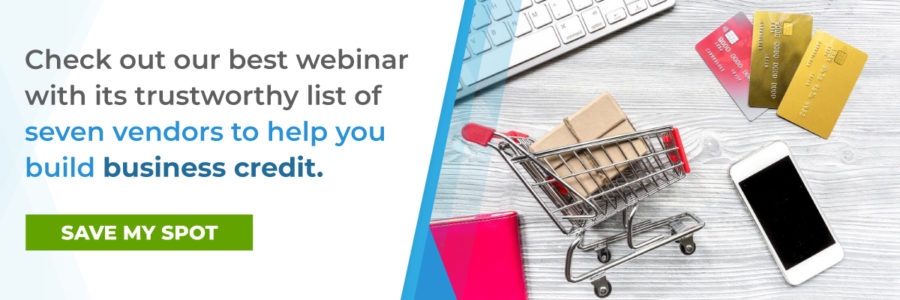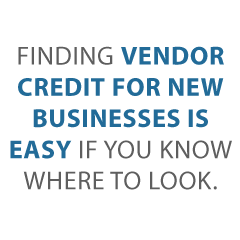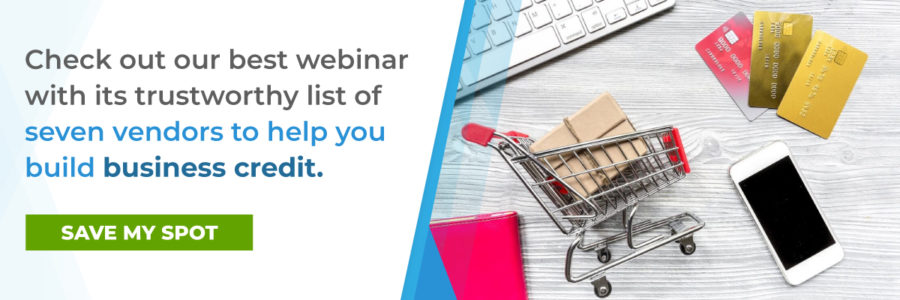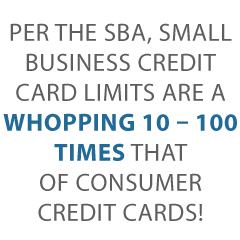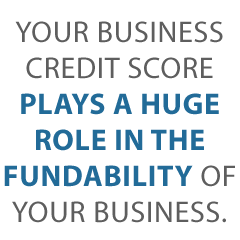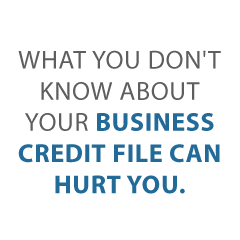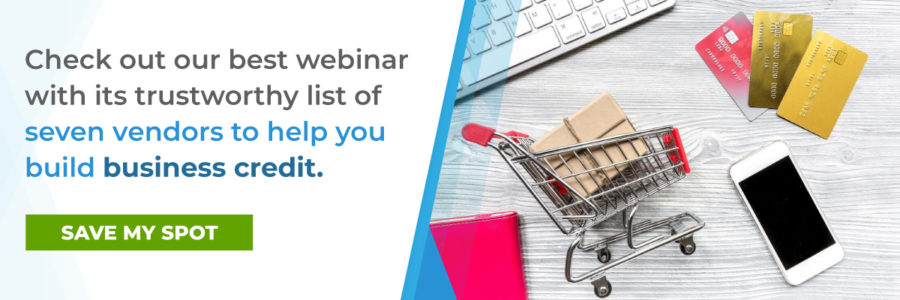
How Does Business Credit Work?
Most business owners know that business credit is a thing, but they do not understand how it works. Many have the idea that all they have to do is apply for credit with their business name to begin building it, but that’s not quite right. Others have no idea it even exists. You cannot successfully build business credit if you do not understand how it works. So, how does business credit work?
Everything You Need to Know About How Does Business Credit Work from the Ground Up
The first thing you need to know about how does business credit work is that it does not build passively like consumer credit. You have to actively work to build it. This starts with how your business is set up. It needs to be set up to be a fundable entity separate from you personally. This is for many reasons, but for business credit it keeps your business and personal credit from getting all mixed up.
How to Build a Fundable Foundation for Business Credit
We like to call this a “fundable foundation” or a “foundation of fundability.” Basically, it is setting up your business in a way that makes it appear legitimate and credible. Some of the factors that go into this are common sense, others may surprise you.
How Does Business Credit Work? Contact Information
The first step in setting up a foundation for business credit is to get your business its own phone number, fax number, and address. Surprisingly, this doesn’t mean you have to get a separate phone line, or even a separate location. You can run your business from your home or on your computer, and you do not even have to have a fax machine. Find out more about how this works here and here.
Check out our best webinar with its trustworthy list of seven vendors to help you build business credit.
How Does Business Credit Work? EIN
Your business needs and EIN. This is an identifying number for your business that works the same way your SSN works for you personally. It looks more credible to use this number rather instead of your SSN for business loan applications. Having an EIN is also important for building business credit, as it separates your business accounts from your personal accounts. You can get one for free from the IRS.
How Does Business Credit Work? Incorporating
Incorporating your business as an LLC, S-corp, or corporation is necessary for building business credit. It offers some liability protections, but it also separates your business from your self for definitively, which is essential to the business credit building process.
Which option you choose has more to do with your budget and how much liability protection you need than it does for business credit and fundability. The best thing to do is discuss the issue with your attorney or a tax professional.
Incorporation has to happen as soon as possible. Time in business counts, and it starts over at incorporation. This is true regardless of how long your business has been in operation before incorporation. Not only that, but any positive credit history you have related to your business up until the point of incorporation will be lost as well.
How Does Business Credit Work? You Need a Business Bank Account
You have to open an official business bank account. There are a few reasons for this. First, it even further establishes your business as a separate entity. Next, it will help you keep personal and business finances separate. This is beneficial for tax purposes.
In addition, there are several types of funding that will not be available to you without a business bank account. Some lenders and credit cards want to see one. Also, it’s not possible to get a merchant account without a business bank account. That means, you will not be able to take credit card payments. Consumers tend to spend more when they can pay by credit card.
How Does Business Credit Work? Having the Proper Licenses Matters
A business has to have all of the necessary licenses it needs to be fundable. If it doesn’t, red flags are going to fly up all over the place. Do the research you need to do to ensure you have all of the licenses necessary.
How Does Business Credit Work? A Professional Website is Important
You would probably never dream that your business website could affect your ability to get business credit. However, in today’s world, we all run to the internet first for virtually everything. Often, the website is the first impression your business makes on customers and even lenders. A poorly put together website does not make a good impression.
Spend the time and money necessary to ensure your website is professionally designed and works well. Do not use a free hosting service. Rather, pay for hosting. Along these same lines, your business needs a dedicated business email address. Make sure it has the same URL as your Website. Free email services such as Yahoo and Gmail are not sufficient.
How Does Business Credit Work? D-U-N-S Number
If you do not have a D-U-N-S number, you will not have a credit file with Dun & Bradstreet. Since they are the largest and most commonly used business credit reporting agency, that would seriously affect your business credit potential.
Check out our best webinar with its trustworthy list of seven vendors to help you build business credit.
It’s free and easy to get a D-U-N-S number. You just go here. However, be aware that they will try to sell you a number of other products that you do not need. Just put your blinders on and keep pressing toward the goal of getting that number, which again, is free.
How Does Business Credit Work? Next Steps
After you have your business set up as a fundable entity, you will have to get accounts reporting to the business credit reporting agencies (CRAs.) It’s not as easy as just applying for credit and making payments. Here’s why. You have to have business credit to get business credit. Until you have and established score, most lenders will not approve you for funds.
How do you get around this? The first thing you can do is talk to those vendors you already have a relationship with. With an established relationship, they may be more likely to extend credit without a credit check. Be sure to ask them if they will report however, because if they will not it doesn’t matter.
You can also ask utilities and other monthly payments to report. Electric companies, phone companies, and even internet providers might report your payments if you ask. They don’t have to, but it can’t hurt to try.
In addition, there’s a little secret known as the vendor credit tier. These are starter vendors that will award net terms on invoices without a credit check, and then they will report your payments to the CRAs. This will get the ball rolling.
How do I Find Starter Vendors?
Vendors that fall into the vendor credit tier do not necessarily advertise themselves as such. As a result, they can be hard to find on their own. Here are a few options to get you started.
Grainger Industrial Supply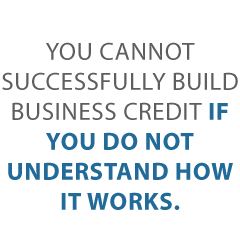
Grainger sells power tools, pumps, and hardware among other things. You can apply by fax or phone. If you need less than $1,000 in credit, you only have to have a business license for approval. For over $1,000, you will need trade and bank references.
If you are just starting out and do not have references, the $1,000 is plenty to get you started building business credit. Go here to get started.
Quill Office Supplies
Quill is popular and easy to get started with. They sell office supplies as well as cleaning and packaging supplies. Generally, you can get most of what you would use in the everyday running of a business from them.
They report to D&B. If you do not already have a D&B score, you will have to place an initial order first. Typically, they establish a 90-day prepay schedule. Then, if you order each month for three months, they will approve you for a Net 30 account.
Get started with Quill here.
Uline Shipping Supplies
Uline reports to Dun & Bradstreet. They carry shipping boxes, dollies, janitorial supplies, and more. Since they report to D&B, you have to have a DUNS number before you get started with them. They will also ask you for a bank reference and two other references. In the beginning, you may need to prepay before they will approve Net 30 terms.
Find out more about Uline here.
Behalf.com
Behalf is way of getting paid through an app, but they funding as well. The more often you have customers pay through Behalf, the more likely they are to offer you favorable funding terms.
They offer both purchase financing and virtual MasterCard options. Terms run from Net 30 to 180 days, and they report to Dun & Bradstreet, Experian, and Equifax. This fact alone, that they report to all the major credit reporting agencies, makes them extremely valuable when building business credit.
Find out more here.
How Does Business Credit Work? The Other Credit Tiers
The vendor credit tier is like a gateway tier to the other credit tiers. It goes a little something like this.
Retail Credit Tier
Once there are 5 to 8 or more vendor trade accounts reporting to at least one of the CRAs, then move to the retail credit tier. For example, Lowes falls into this tier and reports to D&B, Equifax and Business Experian. They need to see a PAYDEX score of 78 or higher. The PAYDEX score comes from D&B, so you need a D-U-N-S number for anyone that uses PAYDEX. Most do.
Fleet Credit Tier
Once you have enough retail accounts reporting, move to the fleet credit tier. This is credit that you can only use to buy fuel, and to fix or maintain vehicles. One example is Shell, who reports to D&B and Business Experian. They want to see a PAYDEX Score of 78 or better and a 411-business phone listing.
In addition, Shell might say they want a certain amount of time in business or profits. But if you already have sufficient vendor accounts, that may not be necessary.
Cash Credit Tier
Here is a good example of how business credit works. If you handle your credit responsibly in the other tiers, you can start to apply for cards in the cash credit tier.
These are service providers such as Walmart and Dell, and also Home Depot, BP, and Racetrac. They are usually MasterCard credit cards. If you have 14 trade accounts reporting, then these are in reach.
Check out our best webinar with its trustworthy list of seven vendors to help you build business credit.
How Does Business Credit Work? The Application Process
Having your business set up properly is only the first step. Once you start applying for business credit you have to use your business information. Use your business address, business phone, and EIN. Do not use your SSN as part of the credit application, but be aware that they may ask for it, along with your birthday, for identification purposes due to fraud concerns.
By using your business information and not your personal information, you ensure your business credit transactions are not mixed up with consumer credit transactions.
Business Credit is Just One Part of Fundability
Fundability is composed of many layers, and business credit is just one part with layers all its own. It is a large part of fundability, but there is a lot more out there. One thing is for sure, you have to have the same foundation for both business credit and fundability, so it’s best to take care of that part as soon as possible. To find out more about fundability and what affects it, go here.
Why Is Business Credit Important to Fundability?
When you look at fundability, personal credit affects it as well. Knowing that, it’s natural to question why business credit matters at all. Why do we need two different kinds of credit? There are few reasons, but two of them are glaring once you understand how it all works. First, it costs a lot to run a business, and personal credit limits are not as high as business credit. If you try to put business expenses all on personal credit, you are going to hover near your limits, which will have a negative effect on your personal credit score. That could keep you from being able to get a loan for a house or a car due to simply running your business.
Also, if you have a good business credit score, you will likely have higher credit limits available to you. This will help ensure you have access to the funds you need to run and grow your business.
How Does Business Credit Work? It Is a Process
When trying to answer the question of how does business credit work, you have to remember that it’s not a short answer. There is a process that has to be followed. It starts at ground level with the foundation. Then you have to travel up several credit tiers, using your credit responsibly and making payments on time as you go. This will ensure you build a strong business credit score that will only increase your fundability.
The post How Does Business Credit Work? appeared first on Credit Suite.


